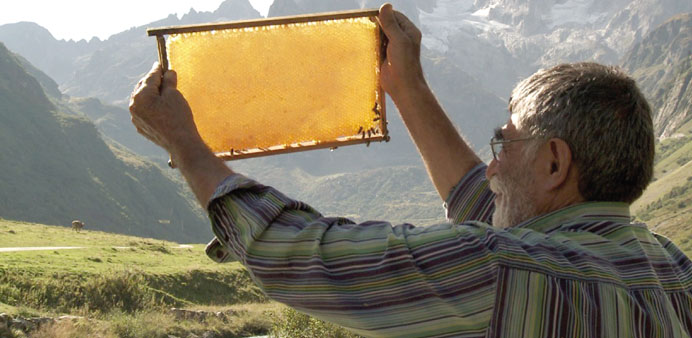BEE-SOTTED:The film relates the touching story of Ibrahim Gezer, a Kurdish beekeeper from southeast Turkey, and his unusual experience of integration into the seemingly conservative heart of today’s Switzerland.
Filmmaker Mano Khalil’s The Beekeeper is a story of a peace-loving man whose world is shaken upside down by conflict
By Umer Nangiana
When conflict destroys life; only hope and an unshakeable faith in humanity would keep it moving. Mano Khalil, a Kurdish-Syrian filmmaker, has masterfully captured the essence of this philosophy in his documentary, The Beekeeper, story of a peace-loving man whose world is shaken upside down by conflict.
Visually depicting the horrors of war, The Beekeeper, provided the perfect note to end the two-day German-Language Cinema celebration (Perspektive Kino) at Katara Drama Theatre organised by Doha Film Institute (DFI) in collaboration with Austrian, German and Swiss embassies.
The film relates the touching story of Ibrahim Gezer, a Kurdish beekeeper from southeast Turkey, and his unusual experience of integration into the seemingly conservative heart of today’s Switzerland.
The turmoil of the decades-long conflict between the Turkish state and the armed Kurdish guerrilla movement, the Kurdistan Workers’ Party (PKK), robbed Gezer of everything that he had: his wife, two of his children, his country, and over 500 bee colonies, his means of making a living. Gezer has been left only with his love for bees and his unshakeable faith in humanity. Displaced from his home and livelihood, the beekeeper discovers a new life in Switzerland, where he is a refugee among many others. By nature he is a man incapable of hate.
“I like people so much. When you like someone, he likes you,” the old Gezer tells the audience at the time he is yet discovering his new life in Switzerland and beginning to find it a little difficult.
He is a man who loves his land, his home and his bees, but after displacement he has lost them all. War must not touch such people but then the conflict-devastation is indiscriminate. His craving to spend time with bees is strong that Gezer does not want to work in a factory, as he was made to at the refugee camp in Switzerland.
He is told he cannot retire until he reaches the age of superannuation, 65 years. Gezer was that old but the entry on his ID was incorrect. To get closer to his bees and spend more time with them, Gezer gets onto getting his age fixed and this is where he discovers the bureaucratic complexities of the system.
One of his sons had joined the Kurdish armed movement before the family was hit by the decades-long conflict’s raging fist and was forced to leave their home. He has not heard of his son since then. And then his 500 and more bee colonies were left behind. Gezer is frustrated. “I feel as I have been buried alive,” he tells the viewers at this time.
The filmmaker has intelligently woven the story around his constant love for human beings and nature despite all his frustrations. In spite of his dislike for his new life, Gezer finds hope and happiness in small things. He loves making friends. For him “it is a relationship”. He particularly adores children besides his grandson.
Then he reads in a newspaper about his son’s death and later received a condolence call from the party, He wants to weep his heart out but does not show the people and his other children that he was being weak. But secretly at the house of his newly-made friends, Gezer wept his heart out.
Although somewhat dragging in the middle, the film keeps the interest alive with the key question lingering on till the ending. What would become of the man and his life? How would he move on and to what end?
But Gezer has decided to move on and start a new life with his bees. Beekeeping was more of a hobby in Switzerland so he had to trick the authorities to take a grant of 3,000 Francs to buy furniture for his apartment. By now he had retired after the lengthy process of correction of his age.
He takes the money to buy bees and goes to live in the Alps, surrounded by a group of Swiss friends. Unable to speak the language, he communicates with them through gestures and facial expressions most of the time. This was his dream, a new life with his bees. He finds it. Gezer concludes the story himself by comparing his world with the bees’ world. Theirs is more orderly and harmonious, he tells the viewers. “I could not bring the same order into my life. Bees were smarter than I thought,” and his signs off.
Khalil, the director, kept the movie devoid of any special effects or musical intrusions, giving the central character and his story more time. He has done most of his camera work himself and captured some breathtakingly beautiful scenes for the settings of the movie. It made the film all the more interesting.

